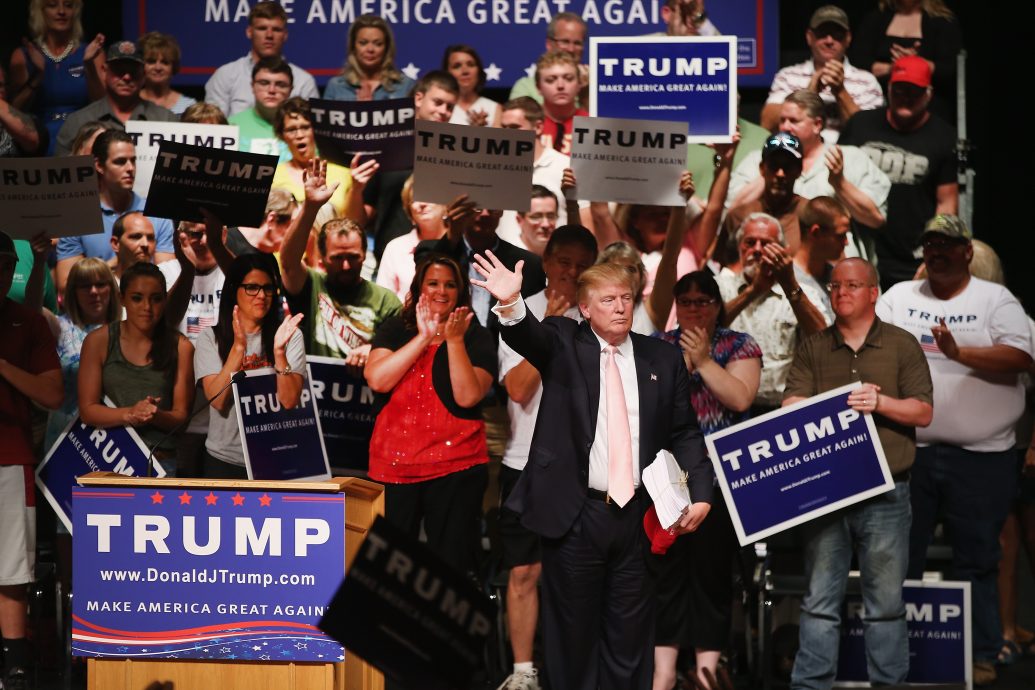The Party Can't Comb Over Its Problems
Like a fever or an irregular heartbeat, Donald Trump’s surge in the GOP primary polls provides important information about the state of the party of Lincoln. Mr. Trump, a terrible candidate in many ways, is inexperienced as a politician. Rhetorically, his mode tends to excess, and only to excess. Moreover, as some have pointed out, given the positions Trump has held over the years, calling him a “Republican” or a “conservative” is a stretch. That said, his current positions are conservative. Which is why his candidacy—in or out of the GOP—might harm the party’s chances of retaking the presidency, and this, in addition to his drawing so much attention away from better candidates, has angered many commentators.
The Trump boomlet is best understood as a rebellion. In politics, rebellions convey important information—while they must be quashed before they become revolutions, they are not everyday occurrences and so ought to be heeded. As the Declaration of Independence reminds us, “all experience hath shewn, that mankind are more disposed to suffer, while evils are sufferable.” In other words, the default mode is for us to be politically lazy. When citizens are up in arms, something is wrong. Clearly were the GOP in better shape, Trump would not be where he is just now.
And that brings us to his signature issue: immigration, a wedge issue for the GOP. It splits the party’s base from its donors, leaders, and, to a degree, its intellectuals. On what other topic do the Koch brothers, Rupert Murdoch, the editorial page of Murdoch’s Wall Street Journal, and the Chamber of Commerce, among others, side so consistently with Harry Reid, Nancy Pelosi, George Soros, the Sulzbergers and their New York Times? Meanwhile, the party’s politicos understand that the ever-increasing percentage of Americans who are Latino is a political reality, and it is a bad idea to alienate them by acting tough or even sounding tough on immigration, legal or illegal. Yet most GOP voters want a tough approach to illegal immigration.
The Left’s favorite explanation is that this is racism. There might be some of that, but I rather doubt that that’s what’s really driving things here. Consider that among non-Latino Americans in general, ordinary people are on one side, the elites on the other. Over 80 percent of Americans, for example, think that people should have to prove that they are here legally before receiving services paid for with taxpayer dollars. (I wonder if people were polled about emergency services, they would agree to that exception. I bet most Americans would. Then again, I also wonder why, in principle, it would be wrong to charge their countries of origin for those services.)
Over 60 percent of Americans think the government should enforce immigration laws more aggressively. And yet the fence that was supposed to be built under the law that President George W. Bush signed has not really been built. President Bush, we should add, did not get the bill he wanted. He wanted an amnesty, but the voters pushed for a fence bill instead. Some politicians probably hope that new citizens will be less obstreperous (link no longer available) than the Tea Party types who are making life difficult for our political class. Meanwhile, enforcement of our immigration laws is declining.
I am not sure who the last President was who actively enforced this part of our laws, even though the President’s oath obliges the President to “preserve, protect and defend the Constitution of the United States,” and declining to enforce, or reluctantly enforcing the law of the land can hardly square with that obligation. Trump’s surge largely stems from the belief, on the part of many Americans, that their government is treating them with contempt.
We the people are supposed to make the laws. Those who staff the government, be they elected officials, appointed judges, or civil servants, are our employees. They are to enforce the laws we make. To be sure, no law can be perfectly enforced, and some laws are simply unenforceable. Perhaps that is true, to a degree, here. Still, ordinary voters are not wrong that there are powerful interests that do not want to enforce our immigration laws. Neither corporate interests nor multicultural interests want the will of the people to rule here. The professional Left, which has deep roots in our administrative agencies, has contempt for the common American voter, as the attack on “White privilege” demonstrates. From their perspective, bringing in millions of immigrants from other countries might make America a better place. Ordinary voters, sensing this contempt, are angry about immigration.
In a post about Trump, Mona Charen laments that he is “evidence that political intemperance is not limited to the Left.” Of course it isn’t, nor has political intemperance ever taken a vacation from our politics. Remember the election of 1800? Charen notes, not incorrectly, that:
A number of Republican candidates for president have been seeking to recast the Republican Party as the party of reform and outreach. They recognize that a party that lost not just the Hispanic vote, the black vote, the women’s vote and the youth vote, but also the Asian vote has an image problem. As any number of successful Republican senators and governors have shown, it isn’t necessary to adopt any particular policy (e.g., amnesty) to attract the votes of more Hispanics or Asians. It is necessary for the party to convey a welcoming spirit. Such a tone may even attract fence-sitting white voters who are left cold by a party that appears uninterested in the plight of the poor.
And what better way to appeal to all voters than to appeal to them as citizens? Perhaps that is the key to talking about immigration. A candidate might say something like this:
“We are a nation of laws. The people have enacted laws that limit the number of immigrants who may legally join us here in the U.S. That being the case, it is incumbent upon the people’s representatives to enforce the law. We are also a generous people, and were are a nation of people whose ancestors almost all came from somewhere else. That being the case, we sympathize with those who come here seeking opportunity. I have faith in the American people. And once we, the people’s servants, have proven that we can enforce the law, I believe that the American people would approve of a generous settlement with those who have come here, worked, and lived peacefully.”
In other words, GOP politicians must show the same kind of empathy for the concerns of the common primary voter that they wish to show for immigrants. Failure to do that will only pour gasoline on the fire.
In his “Discourses on Davila,” John Adams wrote that the basic political passion is the desire to be loved:
“Who will love me then?” was the pathetic reply of one, who starved himself to feed his mastiff, to a charitable passenger, who advised him to kill or sell the animal. In this “who will love me then?” there is a key to the human heart; to the history of human life and manners; and to the rise and fall of empires. To feel ourselves unheeded, chills the most pleasing hope, damps the most fond desire, checks the most agreeable wish, disappoints the most ardent expectations of human nature.
The perception that we are unheeded by our governing class is behind the Trump phenomenon. For it to end, the frustrated voter must be treated with respect, no less than any other voter or potential voter.
And that reminds me of Thomas Jefferson’s famous comments about Shays’ Rebellion:
I hold it that a little rebellion now and then is a good thing, and as necessary in the political world as storms in the physical. Unsuccessful rebellions, indeed, generally establish the encroachments on the rights of the people which have produced them. An observation of this truth should render honest republican governors so mild in their punishment of rebellions as not to discourage them too much. It is a medicine necessary for the sound health of government.
Even with our tumultuous politics, we can still thankfully say that in America, as Jefferson wrote to John Adams, “We go on pretty well—for we use no other artillery than goose quills: & our ink is not so deleterious as langrage [scrap-iron bullets] & , grape.” After thwarting Shays’ Rebellion, Massachusetts changed some of the laws that caused it. President Washington stopped the Whiskey Rebellion with an overwhelming show of force—and afterward addressed many of the underlying concerns that had those angry distillers storming about.
Seen in perspective, the Trump Rebellion is tame stuff. May the Republican politicos have the wisdom to heed its lessons.



